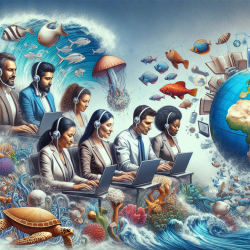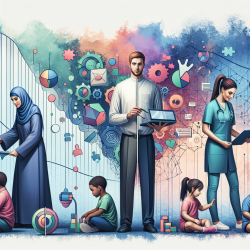Incorporating research outcomes into professional practice can significantly enhance the effectiveness of online therapy services. The recent essay titled "Living in relationship with the Ocean to transform governance in the UN Ocean Decade" presents a novel approach to governance that can be translated into the field of online therapy, especially for practitioners in special education. This blog explores how Ocean-centered governance principles can inform and improve online therapy practices.
Understanding Ocean-Centered Governance
The research by Bender et al. (2022) emphasizes transforming humanity's relationship with the Ocean through Ocean-centered governance. This approach views humanity as interconnected with the Ocean and prioritizes the ecological needs and interests of the Ocean. Key principles include:
- Ocean Rights: Recognizing the Ocean as a living entity with inherent rights.
- Ocean Relationality: Promoting a reciprocal relationship between humans and the Ocean.
- Ocean Data Sovereignty: Ensuring data governance respects the Ocean's needs.
- Ocean Protection: Collective responsibility to protect and conserve the Ocean.
- Ocean Justice: Democratizing decision-making to include the Ocean's interests.
Applying Ocean-Centered Governance to Online Therapy
Adopting these principles can enhance online therapy practices by fostering a more holistic and inclusive approach. Here are some ways practitioners can implement these principles:
1. Embrace Holistic Practices
Just as Ocean-centered governance advocates for holistic management of the Ocean, online therapists should adopt holistic approaches that consider the whole individual, including their environment, community, and unique needs. This can lead to more personalized and effective therapy sessions.
2. Foster Interconnected Relationships
Building strong, interconnected relationships with clients is crucial. Therapists can learn from the Ocean-centered principle of relationality by fostering a supportive and reciprocal relationship with clients, encouraging active participation and feedback in their therapy journey.
3. Prioritize Data Privacy and Sovereignty
Data sovereignty is a key component of Ocean-centered governance. Similarly, online therapists must prioritize the privacy and security of client data, ensuring that it is used ethically and responsibly. Implementing robust data protection measures can build trust and enhance the therapeutic relationship.
4. Advocate for Inclusive Practices
Ocean-centered governance emphasizes inclusivity and democratization. Online therapists should strive to create inclusive therapy environments that respect and incorporate diverse perspectives, including those of marginalized communities. This can be achieved through cultural competence training and inclusive therapy practices.
5. Promote Sustainability and Well-being
Sustainability is at the heart of Ocean-centered governance. Online therapists can promote sustainable practices within their services, such as using eco-friendly digital tools and encouraging clients to engage in activities that support their overall well-being and the environment.
Encouraging Further Research
The principles of Ocean-centered governance offer valuable insights for online therapy practitioners. However, further research is needed to explore how these principles can be effectively implemented in therapy practices. Practitioners are encouraged to engage with the original research and consider how these ideas can be adapted to their work.To read the original research paper, please follow this link:
Living in relationship with the Ocean to transform governance in the UN Ocean Decade.










